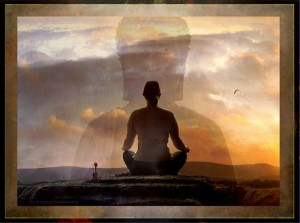
Photo by h.koppdelaney
Do you feel disappointed every time you meditate but don’t experience thoughtlessness? Do you wonder how some meditators seem to routinely enjoy this calming blank space between thoughts? Have you given up your practice because you had too many thoughts while meditating and couldn’t seem to shake them off?
Be anxious no more! In this post, I would like to deconstruct the myth of thoughtlessness and clarify the real objective of meditation. However, before we examine this myth, let’s understand why do we have thoughts in the first place.
Why do we have thoughts
Thoughts are an outcome of our desires which in turn emanate from two key sources. Firstly, they are rooted in our sense of identity. The identity of an independent self, the ‘I’, which is experiencing everything from pain and pleasure to sadness and joy. This identity is intertwined with our human experience. As long as we are in a human body form, we stay attached to this identity and continue to have thoughts.
Secondly, the human form contains the intelligence of our past karma. That’s the storehouse of the net psycho-spiritual effect of all our cumulative intent, volitions and actions across all lifetimes. It includes the seeds of all our desires, aversions, and attachments. This karmic imprint also dictates our judgmental nature – our tendency to judge everything as good or bad.
We remain a prisoner to our desires and attachments. This coupled with our preference for what appears favourable and distaste for the seemingly unfavourable, continually generates new thoughts and emotions.
Myth of thoughtlessness
There are innumerable meditation techniques out there – from chanting, observing the breath and mindfulness to transcendental meditation, zen and vipassana. Irrespective of the specific practice, a commonly held belief is that the aim of meditation is to experience thoughtlessness. Given the extent of constant mental chatter we experience, this sounds like a really attractive goal.
But it’s quite misleading! When we make thoughtlessness the central objective of our meditation practice, we stop receiving the deeper benefits of meditation. Firstly, our attachment to a specific outcome – of experiencing no thoughts – ironically produces more thoughts. Am I doing it right? How come I am not getting to thoughtlessness? The last time was so much better. When we struggle with incessant thoughts – whose arising is actually only normal – we judge ourselves. This only strengthens our existing judgmental nature – an established key source of new thoughts and feelings.
Such attachment and judgmental nature further create new karma – adding to the existing baggage. Not only do we fail to experience thoughtlessness, we actively contribute to the very conditions that generate thoughts in the first place. Pursuing the holy grail of thoughtlessness, we neglect an important reality. So long as we have desires, attachment and a storehouse of karma, we will continue to have thoughts. As we meditate and feel some calmness, we may experience fleeting moments of thoughtlessness. However, unless our past karma is fully purified, such calmness merely results in the next layer of stored desires to arise as new thoughts.
Real objective of meditation
We need to get away from the pursuit of thoughtlessness. Meditation has enormous benefits, but experiencing those requires developing the right understanding. The central aim of meditation is to cultivate non-judgmental awareness. Non-judgmental awareness implies two things. One, being fully aware of our self and our surroundings. Second, responding to everything happening within or outside of us in a non-judgmental manner.
Such awareness includes being aware of our bodily sensations of comfort and discomfort (the physical self), feelings of anxiety and anticipation (the emotional self), our attachments and tendency to judge (the mental self) and our connection with our eternal soul and the karmic identity (the spiritual self).
When we meditate, because of our still and concentrated state, all our thoughts, feelings and sensations appear more clearly and amplified. That’s where the second aspect becomes important. Observing these thoughts and feelings without any judgment – devoid of any bias towards pleasant or the unpleasant, exciting or the disturbing. Aiming to watch these thoughts and feelings with equanimity and seeing them arise and pass away. The moment we get attached to any outcome – for example, wishing for these thoughts to go away – we stray from the path.
Non-judgmental awareness
Cultivating non-judgmental awareness requires developing relaxed concentration. Many meditation techniques follow this – by suggesting to focus on the breath, a mantra or an object. Concentration stills the body and the mind; staying relaxed facilitates holistic awareness of self and our environment. This combination facilitates honing of non-judgmental awareness.
Non-judgmental awareness changes the brain circuitry in many ways. We become less reactive (to positive or negative news) and more responsive (to how we need to engage with the situation). Further, we also learn to let go of the strong sense of ‘I’. We become less attached to our body-form identity and don’t take everything as personally. We become less attached to pleasure, praise and winning and less fearful of pain, blame or losing.
As you embrace your thoughts in a non-judgmental manner, their frequency and power both decline. Thereby, helping you experience the state of thoughtlessness at some point. While such a state maybe a rewarding byproduct, it’s not the aim of meditation.











 Attachment, Suffering, Ignorance and Personal Mastery
Attachment, Suffering, Ignorance and Personal Mastery Unlocking Self-Awareness: The Five Levels of Understanding Yourself
Unlocking Self-Awareness: The Five Levels of Understanding Yourself Discover Your IKIGAI, Create A Life
Discover Your IKIGAI, Create A Life Who Are You, Really?
Who Are You, Really? My Never Ending Things To Do List…
My Never Ending Things To Do List…
Very nice article Rajiv. Do you think Yoga Nidra could result in non-judgmental awareness ? What types of meditation do you recommend ?
Hi Shrikant, good to hear from you. Thanks!
I don’t have direct experience of Yoga Nidra practice but from what I reckon it’s more of a guided technique for deep relaxation. While effective in calming the body and mind, am not sure it requires or facilitates non-judgmental awareness.
My experience has been more with Reiki, Vipassana and TM meditation.
Very well written, clear and precise. I could link it very much to Vipassana meditation practice.
Thank you Rajivji for the clarity with which you have highlighted that the real goal of Meditation is Awareness with Non- judgement.
Being Non- judgemental is crucial to ensuring that we do not generat any new karma or sanskar.
Very practical and truthful assessment of the whole situation. Truly appreciate as it clarifies some of my deeper queries. Thanks Rajiv ji.
Regards
Kapil
Can I receive this to my inbox please ?
Very well written.
Why do identity and judgemental nature create thoughts? What is the purpose of thought?
Thanks Kathir. Our independent identity seeks its survival and betterment and that generates thoughts. We wish and hope to control our future. Besides our stored awareness of a perceived distinction between pleasant and unpleasant experiences (the judgmental nature) generates new desires and thoughts – regretting the past lost opportunities and anxiety about the uncertainty of the future events.
Thoughts are nothing but packets of energy – we can give power to them by getting attached to them or merely observe them (as if we are watching a movie, without getting attached to its characters). The latter allows us to evolve as a human being.
Very nice article Rajiv. Thoughtful and very well written.
Very well expressed Rajiv. May this be the much needed boost to help with my practice of meditation .
Thanks Rajiv, for sharing another nice article. I liked the reasoning provided on “Why do we have thoughts?”
You ended the article with “it’s not the aim of meditation.”, That triggers a question What is the aim of Meditation?, Does it vary from person to person or is one for all.
Thanks Nilesh. The aim of meditation is to cultivate non-judgmental awareness – that’s the real source of peace, strength and happiness.
As always you write your opinion honestly
I feel body and mind are so closely related that relaxation cannot be achieved independently
When my mind is relaxed then only the body is relaxed
This interdependence, interelation and interconnection is so vital that you cannot achieve independently
Absolutely, thank you for highlighting. Mind clearly influences the body and body influences the mind – that’s why it’s challenging to stop the flow of thoughts but what we can try is to practice being a non-judgmental observer of those thoughts. Warm regards, Rajiv
Excellent article, Rajiv.
Thoughtlessness is not the object of meditation as you rightly said. Meditation has to be lead to feeling the inner presence and being in the state of self awareness or awareness of the Higher self if you may want to call it.
What happens through a process of meditation over a period of time and what evolves is an interesting topic also.
I would recommend you also try out Heartfulness Meditation and see how you find it.
Great reading your articles once again!
Affly,
Sharat
Thanks Sharat!
This article really gives the insight into what. Meditation really is. I found it very useful and got me the rid of achieving thoughtlessness Thank you so much. Rajiv
I found this very helpful.
Thanks a lot.